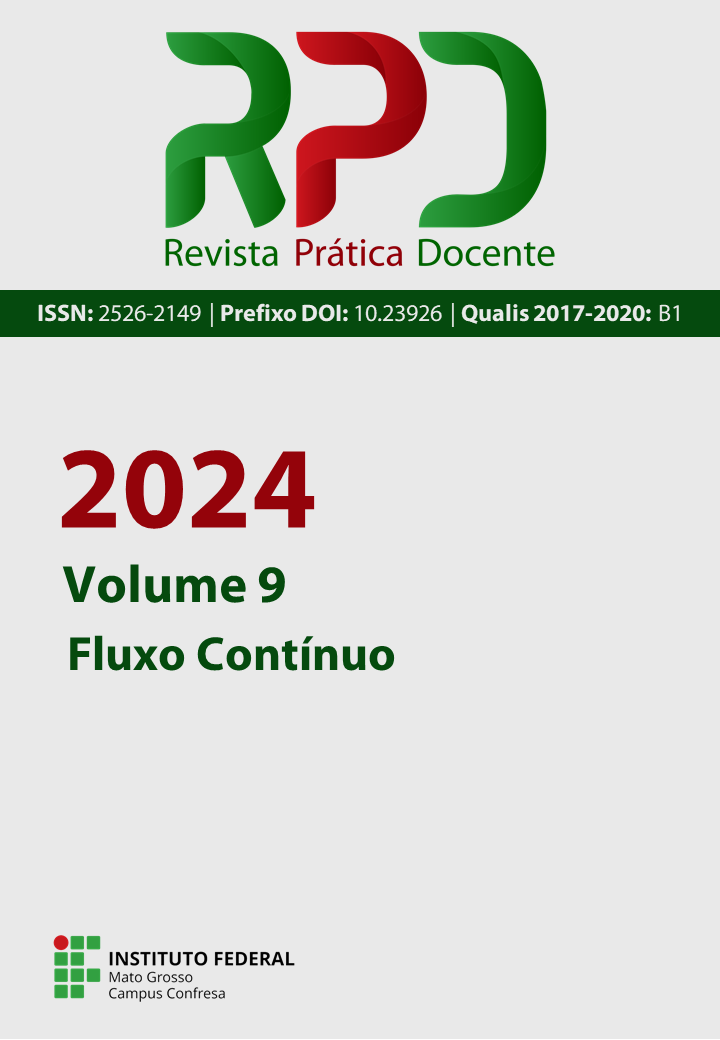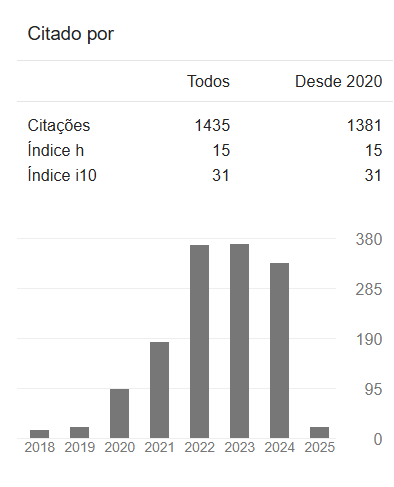The STEAM Approach in Brazil: gaps and implications for Natural Sciences, Humanities, and Mathematics Education
DOI:
10.23926/RPD.2024.v9.e24013.id754Keywords:
STEM Approach, STEAM Approach, Systematic review, Educational Guidelines, BrazilAbstract
High school students encounter difficulties understanding the contents of natural sciences, humanities, and mathematics taught in schools. Numerous studies link disconnected teaching and demotivating methodologies as causes for this issue in the literature. In this perspective, the National Common Curricular Base (hereby BNCC) and the Curriculum Reference Document for Mato Grosso (hereby DRC-MT) propose changes in teaching and learning using active methodologies and the STEAM approach. The aim of this article was to identify key gaps in STEAM approach knowledge in Brazil, as well as its implications for teaching natural sciences and mathematics, enhancing understanding of its application in the country. Based on this, an analysis was conducted on publication locations and applied education levels. This qualitative, interpretive research is part of a bibliographic study, demonstrating a significant increase in production in recent years.
Downloads
Metrics
References
ALMEIDA, Cátia Candida; GRÁCIO, Maria Cláudia Cabrini. Produção científica brasileira sobre o indicador “Fator de Impacto”: um estudo nas bases SciELO, Scopus e Web of Science. Encontros Bibli: revista eletrônica de biblioteconomia e ciência da informação, v. 24, n. 54, p. 62-77, 2019.
BACICH, Lilian; HOLANDA, Leandro. STEAM em sala de aula: a aprendizagem baseada em projetos integrando conhecimentos na educação básica. Porto Alegre: Penso, 2020.
BRASIL. Base Nacional Comum Curricular: educação é a base. MEC. Brasília, 2017a.
BRASIL. Lei Nº 13.415, 16 de fevereiro de 2017. Altera as Leis n º 9.394, de 20 de dezembro de 1996, que estabelece as diretrizes e bases da educação nacional, e 11.494, de 20 de junho 2007, que regulamenta o Fundo de Manutenção e Desenvolvimento da Educação Básica e de Valorização dos Profissionais da Educação, a Consolidação das Leis do Trabalho - CLT, aprovada pelo Decreto-Lei nº 5.452, de 1º de maio de 1943, e o Decreto-Lei nº 236, de 28 de fevereiro de 1967; revoga a Lei nº 11.161, de 5 de agosto de 2005; e institui a Política de Fomento à Implementação de Escolas de Ensino Médio em Tempo Integral. Diário Oficial da União: Brasília, DF, 2017b.
COSTA, Teresa et al. A Bibliometria e a Avaliação da Produção Científica: indicadores e ferramentas. Congresso Nacional de Bibliotecários, Arquivistas e Documentalistas: Integração, Acesso e Valor Social. 2012.
CUARTAS, Gabriel Jaime Vélez; ARIAS, Diana Lucio; LEYDESDORFF, Loet. Regional and global science: Publication from latin America and the caribbean in the SciELO citation índex and the web of science. El Profesional de la Información, v. 25, n. 1, p. 35-46, 2016.
DALMON, Danilo Leite et al. Do students make greater achievement gains in some higher education institutions’ programs than others? Insights from Brazil. Higher Education, v. 78, p. 887-910, 2019.
GALVÃO, Taís Freire; PANSANI, Thais de Souza Andrade; HARRAD, David. Principais itens para relatar revisões sistemáticas e meta-análises: A recomendação PRISMA. Epidemiologia e serviços de saúde, v. 24, p. 335-342, 2015.
GROCHOCKI, Luís Felipe de Miranda; CABELLO, Andrea Felippe. Outlining inbreeding in the brazilian higher education system. Higher Education Quarterly, 2023.
HAI, Alessandra Arce et al. Descobrindo o computador: tecnologia, ciências, design e computação para crianças de 4 e 5 anos. Caderno CEDES, v. 43, n. 120, p. 5-18, 2023.
LANDIM, Claudio; FITZSIMONS, Gail E. The brazilian public schools math olympics (OBMEP): 15 years promoting social mobility through academic achievement. ZDM-Mathematics Education, v. 54, n. 5, p. 1101-1113, 2022.
LÓPEZ, Paula; RODRIGUES-SILVA, Jefferson; ALSINA, Ángel. Brazilian and spanish mathematics teachers’ predispositions towards gamifications in STEAM education. Education Sciences, v. 11, n. 10, 2021.
LORENZIN, Mariana Peão. Sistema de atividade, tensões e transformações em movimento na construção de um currículo orientado pela abordagem STEAM. 2019. Dissertação (Mestrado em Ensino de Ciências) - Universidade de São Paulo, São Paulo, 2019.
MAIA, Dennys Leite; DE CARVALHO, Rodolfo Araújo; APPELT, Veridiana Kelin. Abordagem STEAM na educação básica brasileira: uma revisão de literatura. Revista Tecnologia e Sociedade, v. 17, n. 49, p. 68-88, 2021.
MATO GROSSO. Documento de referência curricular para Mato Grosso – Ensino Médio. SEDUC/MT, Cuiabá, 2021.
PUGLIESE, Gustavo Oliveira. Os modelos pedagógicos de ensino de ciências em dois programas educacionais baseados em STEM (Science, Technology, Engineering and Mathematics). 2017. Dissertação (Mestrado em Genética e Biologia Molecular) – Universidade Estadual de Campinas, Campinas, 2017.
PUGLIESE, Gustavo Oliveira; SANTOS, Vinicio de Macedo. As relações entre o PISA e o movimento STEM education. Educação em Revista, v. 38, 2022.
REZNIK, Gabriela; MASSARANI, Luisa; BARTON, Angela Calabrese. Informal science learning experiences for gender equity, inclusion and belonging in STEM through a feminist intersectional lens. Cultural Studies of Science Education, 2023.
RODRIGUES, Luiz et al. Gamification suffers from the novelty effect but benefits from the familiarization effect: findings from a longitudinal study. International Journal of Educational Technology in Higher Education, v. 19, n. 1, p. 1-25, 2022.
ROSA, Katemari. Science identity possibilities: a look into Blackness, masculinities, and economic power relations. Cultural Studies of Science Education, v. 13, n. 4, p. 1005-1013, 2018.
ROSA, Milton; OREY, Daniel Clark. Anethnomathematical perspective of STEM education in a glocalized world. Bolema: Boletim de Educação Matemática, v. 35, p. 840-876, 2021.
SANDERS, Mark. STEM, STEM education, STEMmania. The technology teacher, 2009.
SILVA, Juarez Bento; SILVA, Isabela Nardi; BILESSIMO, Simone Meister Sommer. Technological structure for technology integration in the classroom, inspired by the maker culture. Journal of Information Technology Education: Research, v. 19, p. 167-204, 2020.
SOARES, Ricardo; De MELLO, Márcia Cristina Santiago; NAEGELE, Rafaela. Impact assessment of an affirmative action to promote diversity, equity, inclusion, and respect in brazilian chemistry during the COVID-19 pandemic. Journal of Chemical Education, v. 99, n. 1, p. 513-518, 2021.
SOUZA, Celso L. et al. A computational approach to support the creation of terminological neologisms in sign languages. Computer Applications in Engineering Education, v. 26, n. 3, p. 517-530, 2018.
TERCARIOL, Adriana Aparecida de Lima; MORETTI, Andressa Algayer da Silva; DE SOUZA, Aguinaldo Robinson. Interschool sciences and Technologies club: na internationalization experience. Dialogia, n. 40, p. 20, 2022.
YAKMAN, Georgette. ST∑@M Education: an overview of creating a model of integrative education. Annual Proceedings, Netherlands, 2008.
YAKMAN, Georgette. What is the point of STE@M?–A Brief Overview. Steam: A Framework for Teaching Across the Disciplines. STEAM Education, v. 7, 2010.
Downloads
Published
How to Cite
Issue
Section
License
Copyright (c) 2024 A Revista Prática Docente tem o direito de primeira publicação

This work is licensed under a Creative Commons Attribution-NonCommercial 4.0 International License.
Authors who publish in this journal agree to the following terms:
- Authors retain the copyright and grant the journal the right of first publication, with the paper simultaneously licensed under the Licença Creative Commons Attribution allows the sharing of the work with acknowledgment of authorship and initial publication in this journal.
- Authors are authorized to take additional contracts separately, for non-exclusive distribution of the version of the work published in this journal (e.g. publish in institutional repository or as a book chapter), with acknowledgment of authorship and initial publication in this journal.











